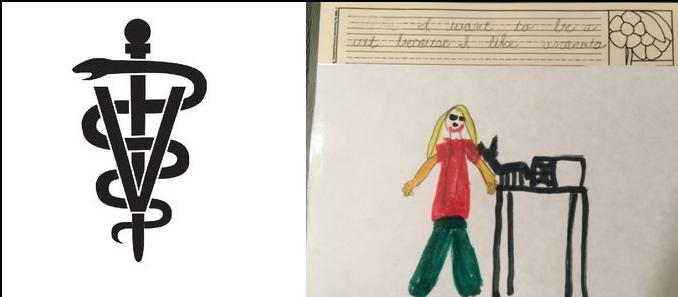
Hi again! Dr. Christina Martini here and this month I would like to share with you a bit about how I became a veterinarian, and how you, or someone you know can become a veterinarian too!
Most, but not all, veterinarians know that this is the career they want from the time they are children. My mom saved a picture I drew when I was seven – it shows me looking at a cat on an exam table with the caption “I want to be a vet because I like animals.”
When I reached high school however, I realized that being a vet was a lot more than just loving animals! It is very important to enjoy science as that is a necessity of the job, and the studies required to get there. I was lucky to have a great high school career counselor who recommended that I also shadow a veterinarian to make sure I could handle the more difficult aspects of the job such as surgery and also end of life situations like euthanasia. For two years I shadowed a veterinarian at his single doctor, small animal clinic. I found that not only did I love the patients; I also enjoyed interacting with the clients, and thankfully had no problems with blood!
Some say that the most difficult part of veterinary school is getting accepted – and that is pretty close to the truth! So many people want to be veterinarians that schools have an acceptance rate of 10% (it is harder to get into veterinary than human medical school!). This means that if you want to become a veterinarian you have to get VERY good grades during your undergraduate years, have work experience, and be involved in many extracurricular activities. For me obtaining my bachelors degree was a blur of working, studying and volunteering to make myself the best veterinary school applicant possible. As a result I often sit in silence while my non-vet friends tell wild stories about their college years partying!
Becoming a veterinarian takes 8 more years of education after high school; four to obtain a Bachelors degree and four of veterinary school. It is recommended to receive your Bachelors degree in a science field, but those with other majors can still complete the prerequisite science classes and apply.
Each veterinary school program is slightly different. At Colorado State University, the first two years are class room based lectures with the equivalent of about 27 credits per semester (as a reference, 12+ credits constitutes full time for most undergraduate programs). Third year days are divided into morning classroom lectures and clinical rotations in the afternoon. Students rotate through all the different specialties in the teaching hospital – emergency, internal medicine, dermatology, cardiology, large animal, etc. The fourth and final year you finally get to put your knowledge and skills to use in the clinic, again rotating through the different specialties, but this time as a doctor. This was by far my favorite year; at long last applying what I had studied so hard! Some veterinary schools such as Colorado State let you pick a “track” to focus on – I chose small animal, but students could also pick large animal or mixed. There is so much to know nowadays with how medicine has advanced, it is rare for veterinarians to treat every species – unlike James Herriot.
After graduating veterinary school, one has the option of going straight into clinical practice or doing an internship. An internship is required before completing a residency if you want to specialize as a veterinary surgeon, internal medicine doctor, cardiologist, dermatologist or oncologist. I decided to do an internship before going into general practice because I knew that the additional year of training under specialists would help hone my skills and make me a better doctor. A veterinary internship is much like a human medical internship – many hours and little sleep! However, the experience was invaluable and I highly recommend it to all new grads!
At this point you can decide to enter general practice or go on to complete a residency and specialize (usually two more years). It is important that your first job has veterinarians that are supportive and willing to mentor. I absolutely love being a veterinarian and feel so fortunate that I genuinely look forward to coming to work every day. I highly recommend this career to those who are hard working, dedicated and enjoy the field of science and have a passion to help animals.
